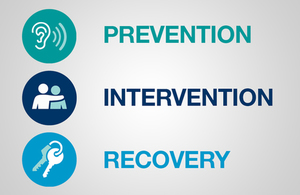Rough sleeping strategy: prevention, intervention, recovery
Up to 6,000 vulnerable people will receive rapid specialist assessments and support under new measures in the government鈥檚 rough sleeping strategy.

Up to 6,000 vulnerable people will receive rapid specialist assessments and support under new measures in the government鈥檚 rough sleeping strategy.
Backed by 拢100 million of funding, the strategy sets out the next steps towards achieving our aim of supporting everyone off the streets and into a home, and to end rough sleeping entirely by 2027.
Following 拢30 million of new funding for areas with the highest numbers of rough sleepers and the launch of the Housing First pilots, this strategy was developed across government and in conjunction with the Rough Sleeping Advisory Panel which is made up of representatives from the homelessness sector and local government. It sets out a three-pillared approach:
- Prevention 鈥� understanding the issues that lead to rough sleeping and providing timely support for those at risk
- Intervention 鈥� helping those already sleeping rough with swift support tailored to their individual circumstances
- Recovery 鈥� supporting people in finding a new home and rebuilding their lives.
This system has prevention at its heart, focusing on stopping people from becoming homeless in the first place and providing them with the right support to find work and live independently.
Longer term, those sleeping rough will be rapidly housed and offered comprehensive support to ensure their specific needs are addressed so that they can move into suitable permanent accommodation at the earliest opportunity.
Communities Secretary, Rt Hon James Brokenshire MP, said:
It is simply unacceptable that people have to sleep on our streets and I am determined to make it a thing of the past.
Whether people are at risk of rough sleeping, already on the streets or in need of settled accommodation, we now have a solid plan to help the most vulnerable in our society.
And this is not just about putting a roof over their heads but helping them find a place to call home.
They need and deserve our support and, through our expert-backed strategy, I am confident they will get it.
Prevention
Understanding the issues that lead to rough sleeping and being able to address them before people are forced to sleep on our streets is the focus throughout this strategy. It鈥檚 clear there is not a one-size-fits-all solution and so we鈥檒l be listening to individual groups (like LGBT people) to understand how they experience homelessness as well as working to build our understanding of the links between modern slavery and rough sleeping.
We鈥檒l also be launching a range of new pilots to help those leaving prison find stable and sustainable accommodation and have committed new funding to intensive support for those with complex needs leaving care.
Intervention
Building on the work of the Rough Sleeping Initiative, we鈥檙e setting aside up to 拢17 million to fund 鈥楽omewhere Safe to Stay鈥� pilots to rapidly assess the needs of people at risk of rough sleeping and support them to get the right help. We will work locally with NHS England and Public Health England to fill gaps in health services for people sleeping rough as part of the long term plan for the health and social care. This starts with 拢2 million this year, and we have asked NHS England to spend up to 拢30 million over the next 5 years on health services for people who sleep rough.
To support this we鈥檙e also investing in training for front-line staff, including training on how to interact with those under the influence of substances like spice, identifying and supporting victims of modern slavery and domestic abuse, as well as how to effectively support LGBT people who are homeless.
We are also introducing 鈥榥avigators鈥�; specialists who will act as trusted confidantes and help people sleeping rough access the appropriate services and accommodation.
There鈥檚 also funding for , supporting the public, business and communities to engage positively with people who sleep rough through an improved app.
Recovery
A stable home is an essential element in a person鈥檚 recovery from sleeping rough but it needs to go hand-in-hand with flexible support that is tailored to individual needs to help them keep it.
This includes 拢50 million of funding that will increase the supply of housing outside of London for people who have slept rough or those who are ready to move on from hostels or refuges and need additional support. A further 拢19 million of funding provides flexible support in homes provided exclusively for people with a history of sleeping rough and funding from dormant assets will provide up to 拢135 million, the majority of which will go to supporting innovative financing for homes for people who sleep, or are at risk of sleeping, rough.
There鈥檚 also funding to help local areas grow enterprises to support vulnerable people into accommodation, offering advice, building stronger relationships with local landlords and making efficient use of local housing supply. Further to this there will now be a homelessness expert in every Jobcentre Plus to offer advice, signpost to information and services, and provide support.
For more information see the rough sleeping strategy.
Office address and general enquiries
2 Marsham StreetLondon
SW1P 4DF
Contact form /gui...
General enquiries: please use this number if you are a member of the public 030 3444 0000
If your enquiry is related to COVID-19 please check our guidance page first before you contact us - /guidance/coronavirus-covid-19-guidance-for-local-government.
If you still need to contact us please use the contact form above to get in touch, because of coronavirus (COVID-19). If you send it by post it will not receive a reply within normal timescale.
Media enquiries
Email [email protected]
Please use this number if you are a journalist wishing to speak to Press Office 0303 444 1209